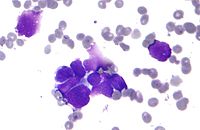
Photo from wikipedia
Multikinase inhibitors with antiangiogenic properties used to be standard therapy for patients with advanced hepatocellular carcinoma (HCC). Recently, several antiangiogenic agents (lenvatinib, cabozantinib, and ramucirumab) have demonstrated antitumor activity for… Click to show full abstract
Multikinase inhibitors with antiangiogenic properties used to be standard therapy for patients with advanced hepatocellular carcinoma (HCC). Recently, several antiangiogenic agents (lenvatinib, cabozantinib, and ramucirumab) have demonstrated antitumor activity for advanced HCC in randomized controlled trials. However, the landscape of drug development for HCC may change dramatically with the advent of immune checkpoint inhibitor therapy, particularly the anti-programmed cell death-1 (anti-PD1) agents. In addition, early-phase clinical trials of combination of anti-PD-1 and antiangiogenic agents have shown very promising anti-tumor activity in patients with advanced HCC. Therefore, the critical research questions at present are whether this combination strategy will be the next generation of standard therapy and which antiangiogenic agents will be the optimal partner for the combination. All of the 4 multikinase inhibitors for HCC (sorafenib, regorafenib, lenvatinib, and cabozantinib) have been reported to have immune modulatory effects. The authors systematically reviewed the pre-clinical evidence of their immune modulatory effects to explore whether these effects were mediated by angiogenesis inhibition or by other "off-target" effects on the tumor microenvironment. Studies of sorafenib comprised the majority (58 of the 71) of the research articles reviewed. Potentially beneficial effects on anti-tumor immunity may result from increased M1 polarization of macrophages and stimulation of CD8 T cell function. On the other hand, high dosage of the kinase inhibitors in pre-clinical models and hypoxia associated with angiogenesis may contribute to immune suppression in the tumor microenvironment. Sorafenib and other multikinase inhibitors may promote anti-tumor immunity through modulation of multiple immune cell types as well as the tumor microenvironment. The optimal immune modulatory dosage should be defined to facilitate design of future combination regimens.
Journal Title: Seminars in liver disease
Year Published: 2018
Link to full text (if available)
Share on Social Media: Sign Up to like & get
recommendations!